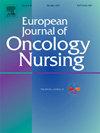Effects of an app-assisted self-management intervention for urinary incontinence on self-efficacy and related outcomes in men with prostate cancer: A randomized controlled feasibility trial
IF 2.7
3区 医学
Q1 NURSING
引用次数: 0
Abstract
Purpose
To assess the feasibility, acceptability, and effectiveness of an app-assisted self-management intervention for urinary incontinence (App-SMI-UI) in men with prostate cancer.
Methods
We recruited men (n = 85) who had been diagnosed with prostate cancer and experienced urinary incontinence following radical prostatectomy. Participants were randomly assigned to the self-management group (n = 43) or the attrition control group (n = 42). The self-management group underwent a 12-week App-SMI-UI while the control group received a single session of multimedia dietary information. Data was collected at baseline, week 12, and week 16. The variables measured were cancer-related self-efficacy, urinary symptoms, social participation, demoralization, resilience, and satisfaction with the intervention.
Results
Compared to the control group, the self-management group had fewer urinary symptoms and a higher willingness to engage in and satisfaction with social activity participation at week 12. By week 16, the self-management group exhibited higher cancer-related self-efficacy, greater participation in interpersonal relationship activities, and continued willingness to engage in and satisfaction with social activity participation.
Conclusion
The App-SMI-UI contributes to improving urinary symptoms, self-efficacy, and social participation among men with prostate cancer. Healthcare providers can use self-management programs to manage urinary incontinence and support prostate cancer men.
app辅助尿失禁自我管理干预对前列腺癌患者自我效能感及相关结局的影响:一项随机对照可行性试验
目的评估app辅助尿失禁自我管理干预(App-SMI-UI)在前列腺癌患者中的可行性、可接受性和有效性。方法我们招募了确诊为前列腺癌并在根治性前列腺切除术后出现尿失禁的男性(n = 85)。参与者被随机分配到自我管理组(n = 43)或减员对照组(n = 42)。自我管理组接受了为期12周的App-SMI-UI,而对照组只接受了一次多媒体饮食信息。在基线、第12周和第16周收集数据。测量的变量包括癌症相关的自我效能、泌尿系统症状、社会参与、士气低落、恢复力和对干预的满意度。结果与对照组相比,自我管理组在第12周的泌尿系统症状较少,参与社会活动的意愿和满意度较高。到第16周,自我管理组表现出更高的癌症相关自我效能感,更多地参与人际关系活动,并继续愿意参与社会活动,并对社会活动感到满意。结论App-SMI-UI有助于改善前列腺癌患者的尿路症状、自我效能感和社会参与。医疗保健提供者可以使用自我管理程序来管理尿失禁和支持前列腺癌男性。
本文章由计算机程序翻译,如有差异,请以英文原文为准。
求助全文
约1分钟内获得全文
求助全文
来源期刊
CiteScore
4.40
自引率
3.60%
发文量
109
审稿时长
57 days
期刊介绍:
The European Journal of Oncology Nursing is an international journal which publishes research of direct relevance to patient care, nurse education, management and policy development. EJON is proud to be the official journal of the European Oncology Nursing Society.
The journal publishes the following types of papers:
• Original research articles
• Review articles

 求助内容:
求助内容: 应助结果提醒方式:
应助结果提醒方式:


